Inside the secret world of the bodyguard
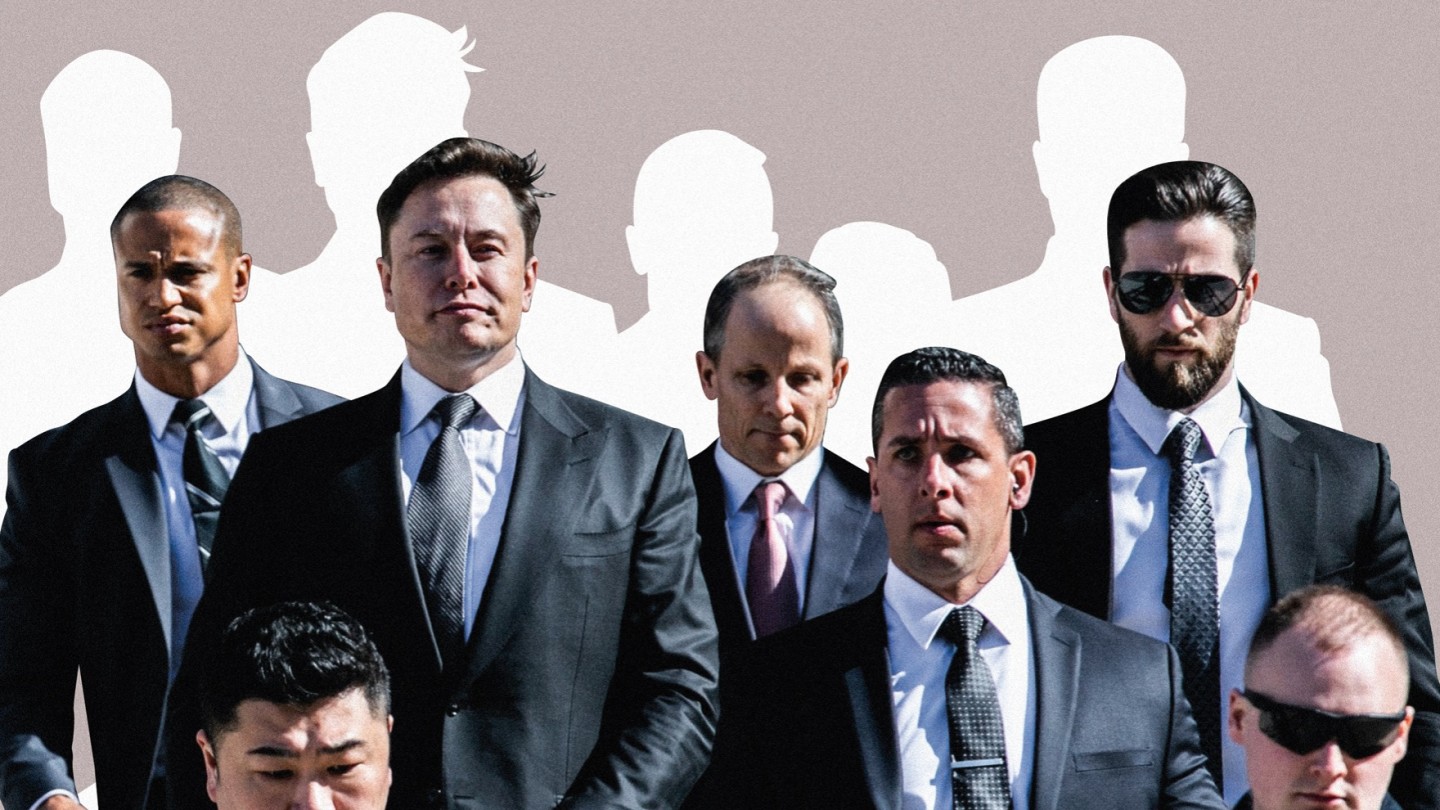
Simply sign up to the Style myFT Digest -- delivered directly to your inbox.
On the surface, Jennifer Lopez and Ben Affleck’s honeymoon tour of Europe looked really rather romantic. But look closer at the paparazzi pictures and a theme quickly emerges: the couple were never without a bodyguard or two. From the streets of Milan to the shores of Lake Como, a compact, smooth-headed chap in a safari jacket tracked their every footstep. When the couple arrived in Paris, the entourage came along for the ride. J-Lo likes a security detail: she even has one accompany her to the gym. Affleck is said to be less than enthused, but the heavies went on honeymoon regardless.
They are not alone. The past couple of years have seen a surge in private security firms offering personal protection services. Squint at any celebrity photo and you’ll undoubtedly spot a figure lurking near the star, from Jennifer Lawrence (who has employed a succession of absurdly handsome giants) to the Beckham children. The Duke and Duchess of Sussex are never without theirs either. And King Charles’s equerry, kilted TikTok sensation Major Johnny Thompson, first served as bodyguard to Queen Elizabeth II. Emperor Augustus created the Praetorian Guard (the first historical record of humans employing bodyguards) to shield himself and his family from assassination, kidnap, robbery and, of course, the general public. Centuries later, the private security industry is booming.
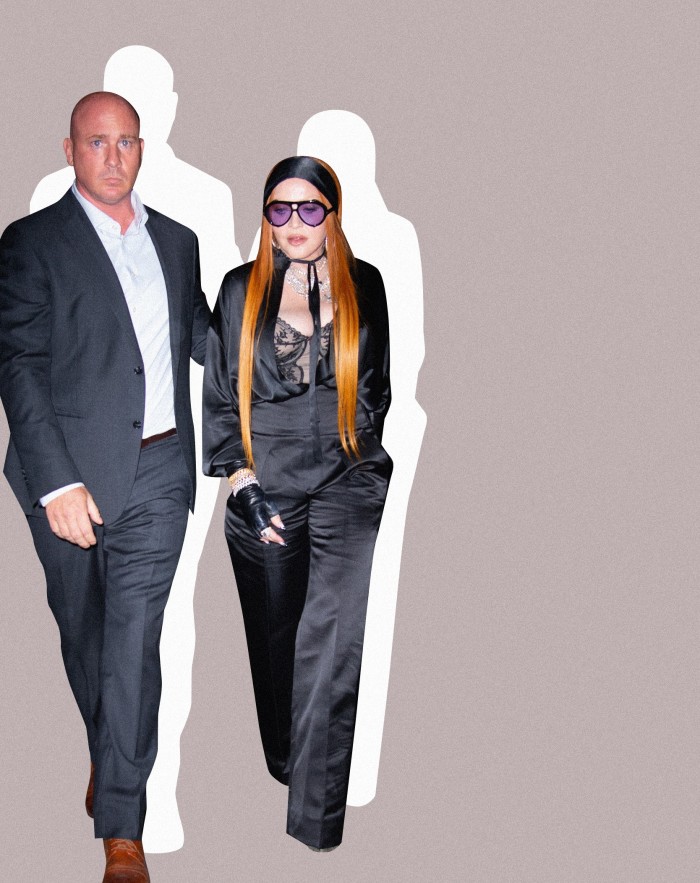
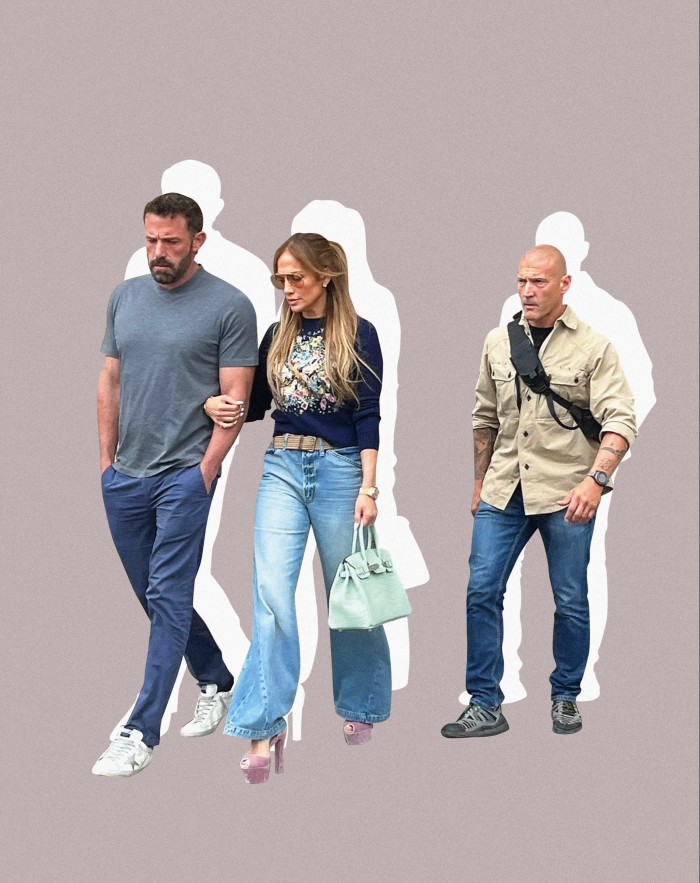
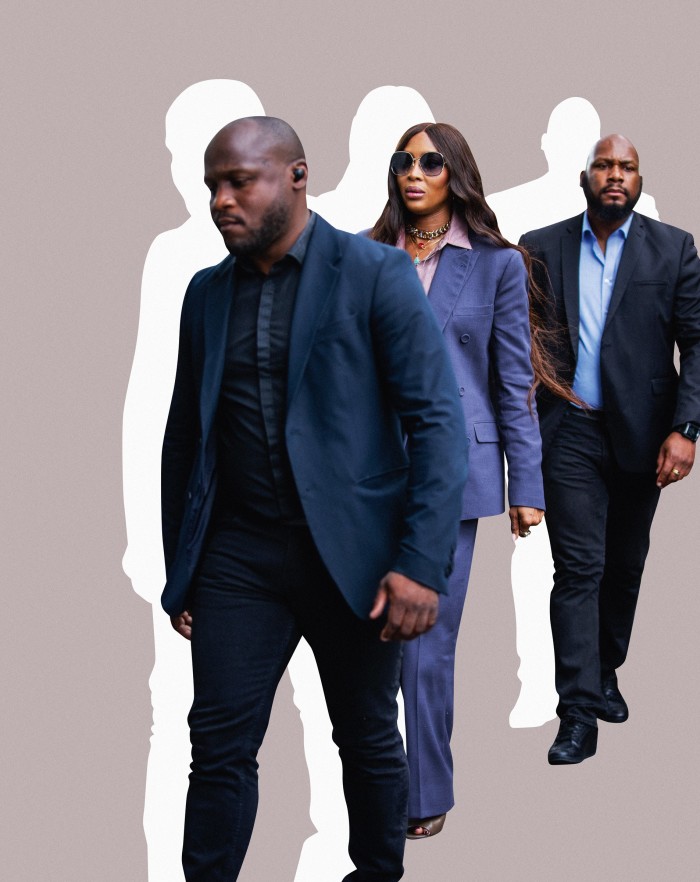
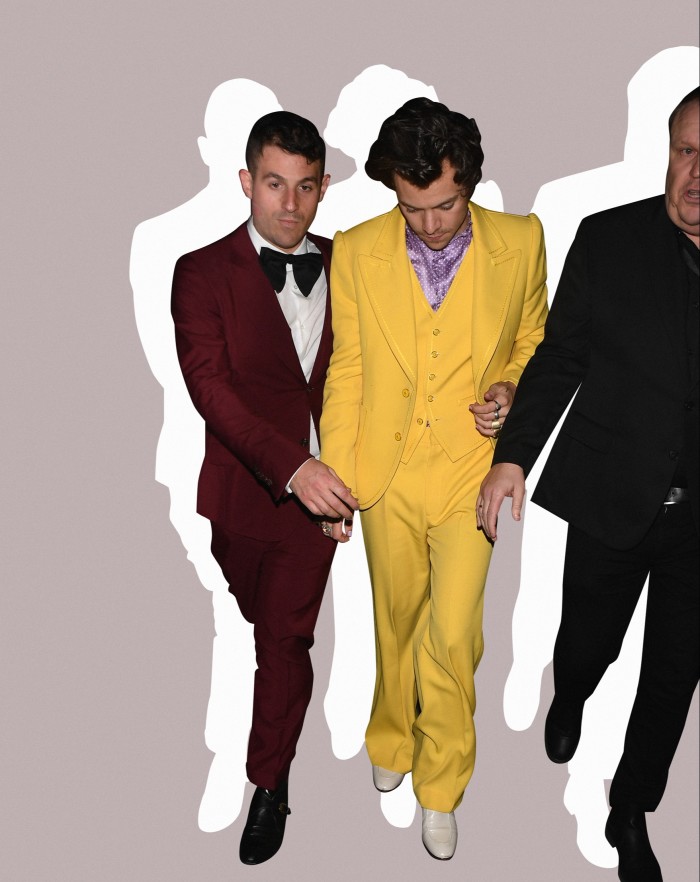
Celebrities and their entourages, many of whom may be bodyguards (due to their secretive nature, this isn’t always confirmed): top row, from left: Madonna in New York, September 2022. Ben Affleck and Jennifer Lopez, July 2022. Above, from left: Naomi Campbell at Paris Fashion Week, June 2022. Harry Styles, 2020
“It has massively evolved,” says a British spy who spoke to me on condition of anonymity. “Twenty years ago, it was unusual to see security so blatantly out in the open; there were connotations of mercenaries. Now it’s a professionally sophisticated and wide-ranging industry.” He estimates the business of protection has grown by at least 500 per cent in the past two decades, and that private security teams are now so commonplace they even accompany government officials when they travel to red-list countries: “It’s so the police don’t have to do it. They’ve got more urgent matters than the protection of diplomats.” Other clients, such as oil-company employees working in difficult regions and war reporters, employ corporate teams to look after them. “I know some members of the press find it irritating at first,” adds the source. “But they soon get used to staying alive.”
War veteran Lt Col Tim Spicer, who served in the Falklands and Northern Ireland, founded Sandline International, a private military company, on retiring in 1994. In 2002, he set up private security firm Aegis Defence Services (engaged by the US government in both Iraq and Afghanistan). “No one calls them bodyguards any more, that’s old hat. They’re now known as CPOs [close protection officers],” he says. “I wish I could tell you the majority of these guards are status symbols, but they are not: the threat is real.”
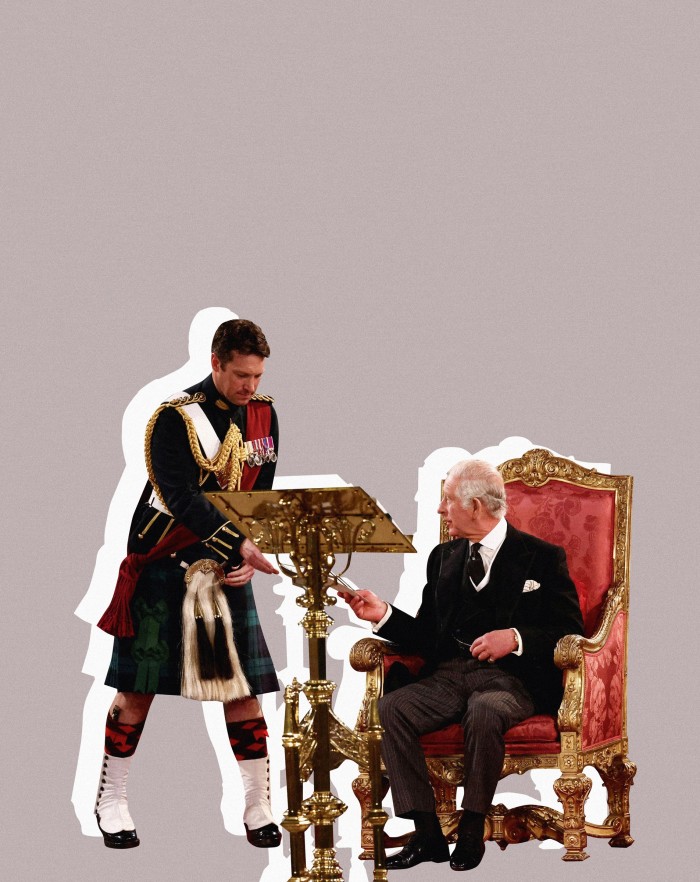
Apparently, the proliferation of rich lists published by newspapers and magazines is partly to blame for the increase. “They are databases, shopping lists for criminals,” says Spicer. Social media has also inevitably made clients more vulnerable. “The number one question with a potential client should always be ‘What is your online profile?’” Spicer continues. “Celebrities reveal too much, then they think, ‘I need protection.’ But if you have proper procedures [ie keep your presence minimal], you don’t actually need a bodyguard.”
An experienced CPO will set you back from about £800 a day, or £80,000 per annum. Expect to pay between £150,000 and £500,000 for a residential security team, where at least two officers stay overnight in your house. “Bandits have become braver,” says Will Geddes, the founder of International Corporate Protection (ICP), who has seen a surge in “house invasions”. “They like it when people are home. It means they can force you to open a safe, or just steal whatever watches and jewellery you happen to be wearing.” Furthermore, that’s merely entry level: if you want drone surveillance or video mapping of your property, the bill can easily reach £1mn per annum.
Once employed, a CPO’s duties are wide-ranging. “They have to map, search, protect and drive,” says Spicer. “They have to visit premises in advance of the client, and conduct research on every employee they might come into contact with.” In addition, they need to be trained in evasive driving techniques, such as short-radius turns and high-speed cornering. And if the CPO is unarmed in America, they can carry pepper spray, expandable batons and a Taser, since it’s legal in most states – not in the UK though.
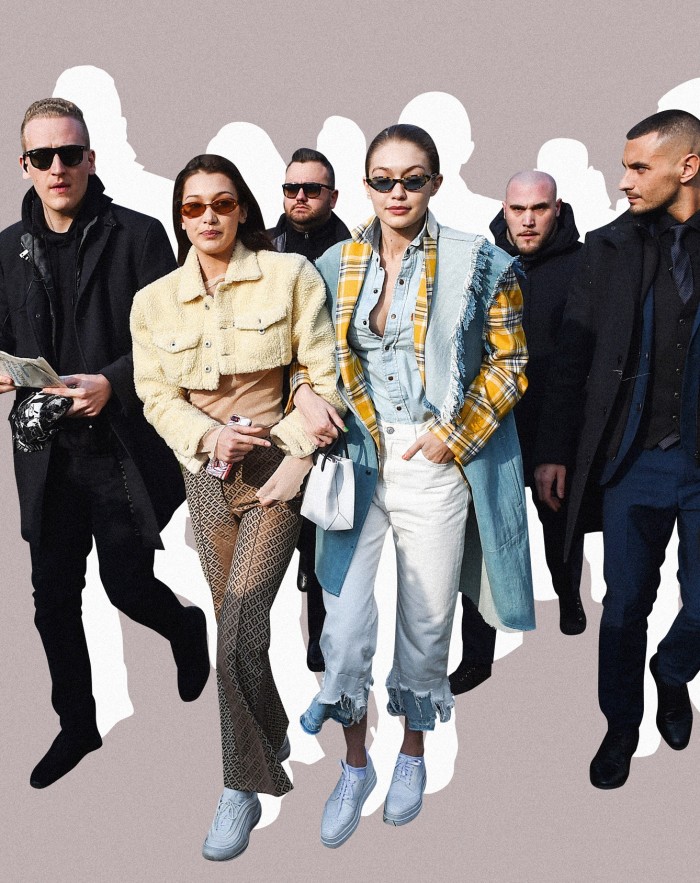
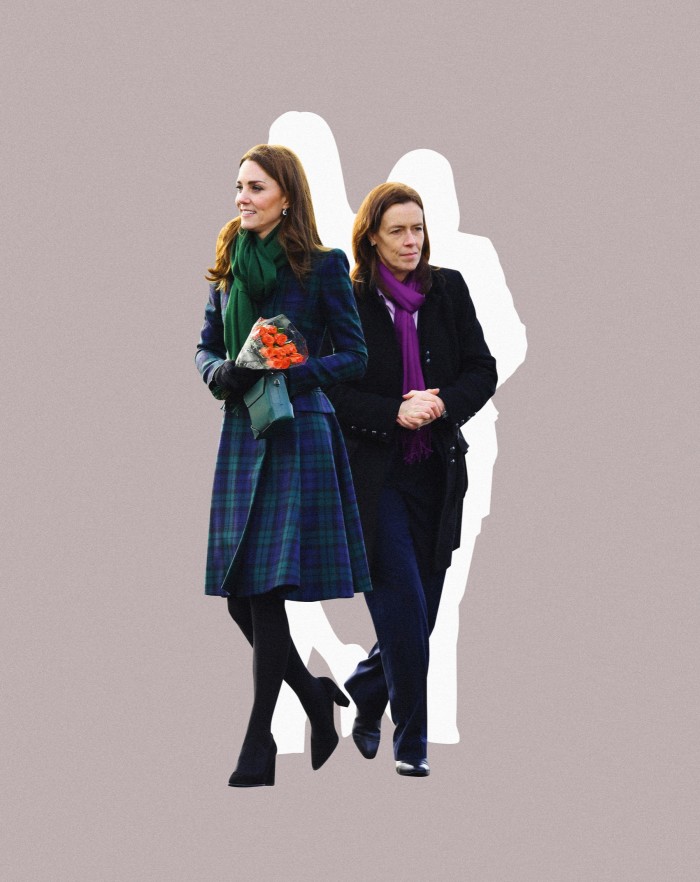
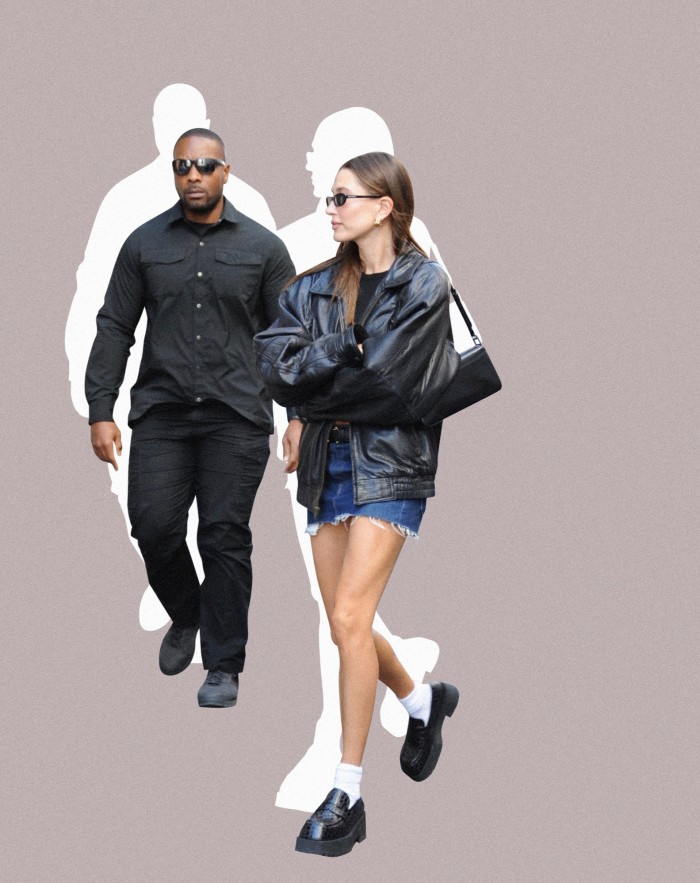

Celebrities and their entourages, many of whom may be bodyguards: top row, from left: Bella and Gigi Hadid at Milan Fashion Week, 2018. The then Duchess of Cambridge with her protection officer Sergeant Emma Probert, 2019. Above, from left: Hailey Bieber, October 2022. Jennifer Lawrence, 2015
Will they take a bullet for you? Yes: it’s always implicit that it’s the CPO’s job to protect the client with their own bodies. “You’re not much of a bodyguard if you don’t guard someone with your own body,” says Geddes, who recruits from a diversity of backgrounds: former special forces, elite military, royalty and specialist protection (RaSP), specialist police units and qualifed professional civilians. “How many you need depends on how desirable a target you are.”
Geddes’ team will assess your threat level based on the information you give them, as well as where your live, who your family is and so on. One bodyguard, or a “solo formation”, means you are considered a relatively low danger level. “If you only see one,” Spicer adds, “then they are mostly doing it for show.” (The new trend in the music business is to hire friends and bouncers as security, known in the field as “buddy-guards” – someone large and intimidating but with little or no training.) Two bodyguards, or the “deuce formation”, is effective for entering or leaving a building or vehicle; three bodyguards (the “triangle formation”) is good for crowded areas. The “quartet formation” is sometimes used by “despots and villains”. The “Star of Texas formation” (five guards) along with the “Star of David” (six) are the safest protection. It means a CPO is never more than one to three metres away from the client – the kind of protection afforded to monarchs and presidents.
It’s not all about formations and triangles. The bodyguard has also become a trophy for the hubristic and the vaunting. “Rich people get them to do their dirty work for them,” says one source. “The daughter of a billionaire we were monitoring would get her father’s team to evict friends from the family’s superyacht when she grew bored with them.”
I speak to a woman who, because of her husband’s very high-profile job, now lives with round-the-clock protection. “It’s for our own wellbeing, we have no choice,” she says. “Our children were scared at first, but what surprised me was how after a couple of months it all felt very normal.” The family has eight bodyguards with them at all times when at home, with another four stationed outside. Friends always tease her about which one she’s going to have an affair with. “We all have conversations together and share jokes, so a close relationship naturally develops. I can totally see why that might happen, when you are one on one and they are responsible for your safety.”
In her case, however, ubiquity has created more of a friendship. When her daughter went vintage shopping recently, she noticed her detail rifling through racks of coloured tutus behind her. “She told me she burst out laughing and whispered to them, ‘What are you doing, you look ridiculous.’ Poor things, they were just trying to blend in, but they looked so out of place.” The familiarity that naturally develops means you start looking out for them too. At Christmas last year, the family put on costumes and took the guards breakfast and presents. “They are seeing our lives in such an intimate way. It is going to be a mental exercise for all of us when we no longer need them.”
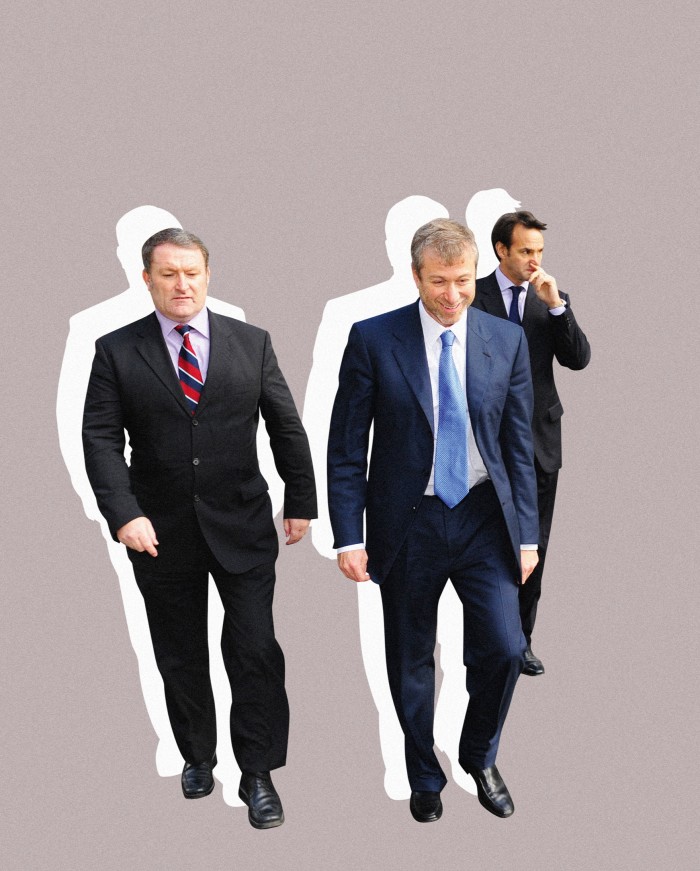
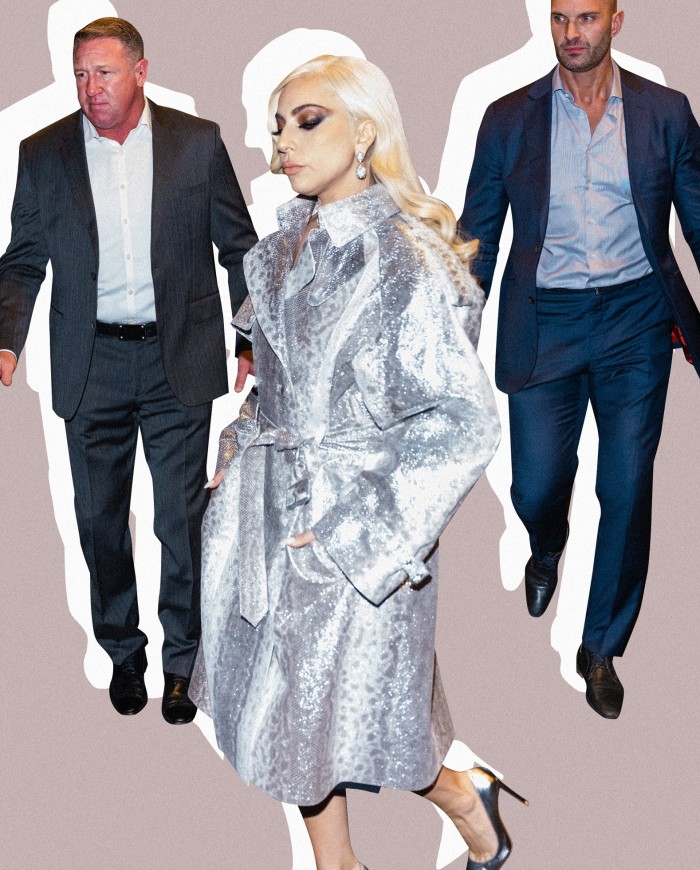
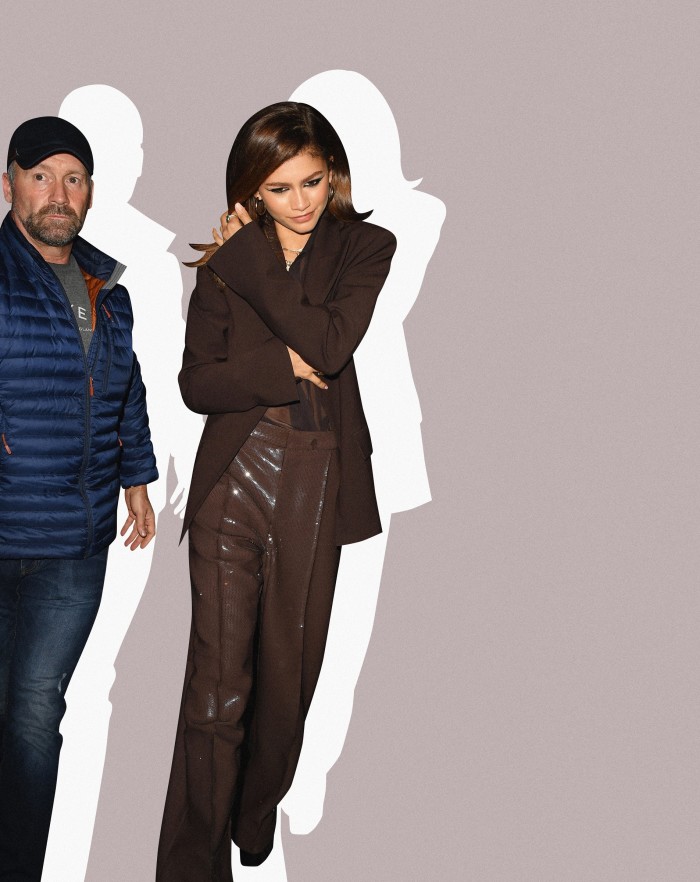
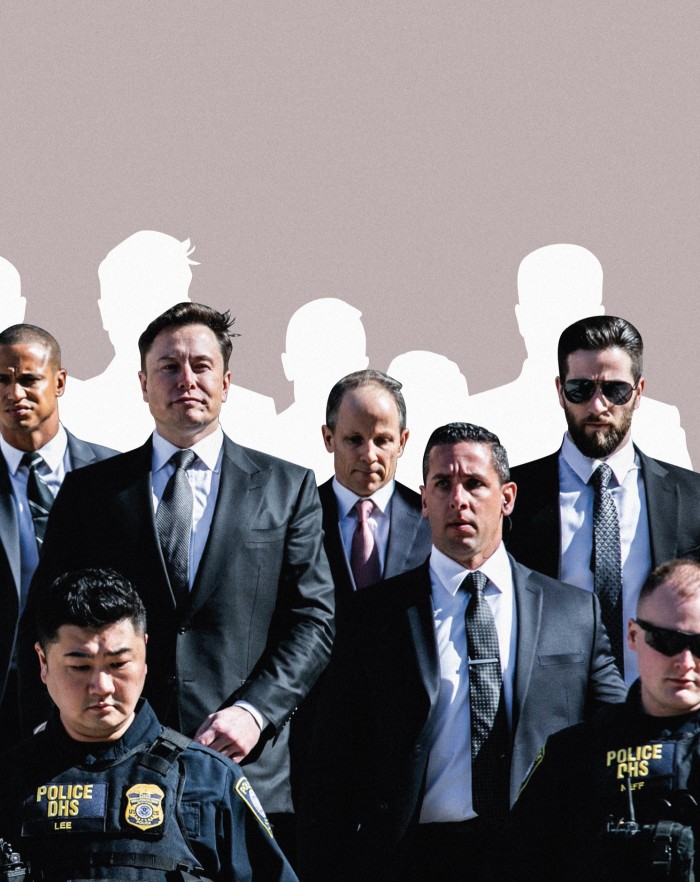
Celebrities and their entourages, many of whom may be bodyguards: top row, from left: Roman Abramovich, 2011. Lady Gaga, 2021. Above, from left: Zendaya, March 2022. Elon Musk, 2019
The more famous starry bodyguard is a red herring. “The ones who get snapped standing near a celebrity looking slick and buff are usually not bodyguards, at least not properly trained ones,” says Geddes. One celebrity clan, he says, “have been through more bodyguards than they’ve had hot dinners – they go for looks. It’s like a celebrity version of ‘show and tell’.” Geddes says he always tries to match clients with protection officers who have similar physical traits to them so they don’t stand out. “I always quote my favourite line in The Bodyguard, where Whitney Houston, on first meeting Kevin Costner, says: ‘You don’t look like a bodyguard.’ He replies: ‘This is my disguise.’ As soon as A-listers understand the difference between the real deal and the ‘show and tell’ types, some will only hire ex-Secret Service. A client of mine said it was like going from driving a Ford Fiesta to a Porsche 911. There’s no comparison.”
For those in the market, Spicer and Geddes advise against hiring from anyone other than a Metropolitan Police-vetted establishment; holding a Security Industry Authority licence is a legal requirement to do the work in the UK. “The last thing you want is a Trojan horse,” says Spicer. “A cheaper unit that hasn’t been officially sanctioned. Because the next thing you know, you are robbed and it was your security guards who let their friends through your front door.”
And while private security is mostly a male profession, women CPOs are on the increase. Catherine, the Princess of Wales’s protection officer for the past 12 years has been Sergeant Emma Probert, a member of Scotland Yard’s protection squad who is trained in martial arts and reportedly always carries a 9mm Glock pistol and a Taser when escorting the Princess. William, the Prince of Wales recently decorated her with the Royal Victorian Order for services to his family. “If I needed protection,” says the former spy, “I would probably go with an all-female team because they’re more strategic.” He mentions a California-based private security company where two-thirds of the client base is female. “If you are in confined places like bathrooms and tour buses, women feel safer with women.”
And not only women, it seems. Libya’s late ruler Muammar Gaddafi surrounded himself with 40 green-uniformed female bodyguards, known as The Revolutionary Nuns, to deter Arab gunmen. The late former model Anna Loginova – who was killed during a car-jacking – ran a Moscow-based female-only team to protect Russian billionaires.
There is, though, another rival for the stereotyped macho CPO. “There’s been a surge in demand for close protection dogs,” says Spicer. “I even saw an ad for them in the back of Country Life the other day. Actually, a normal one that barks loudly should also work a treat.”
This article has been amended to reflect the fact that it is not legal for CPOs to carry pepper spray, expandable batons or a Taser in the UK, but is in some states in the US
Comments